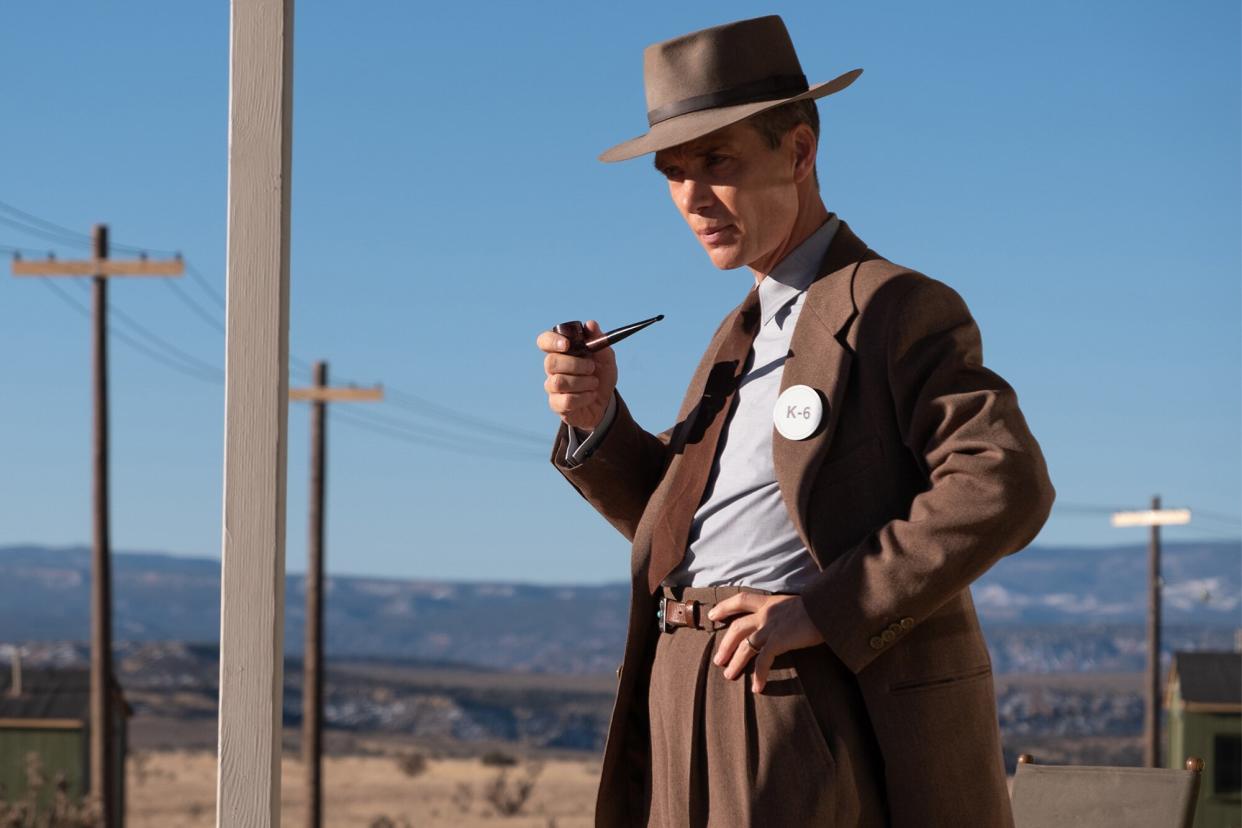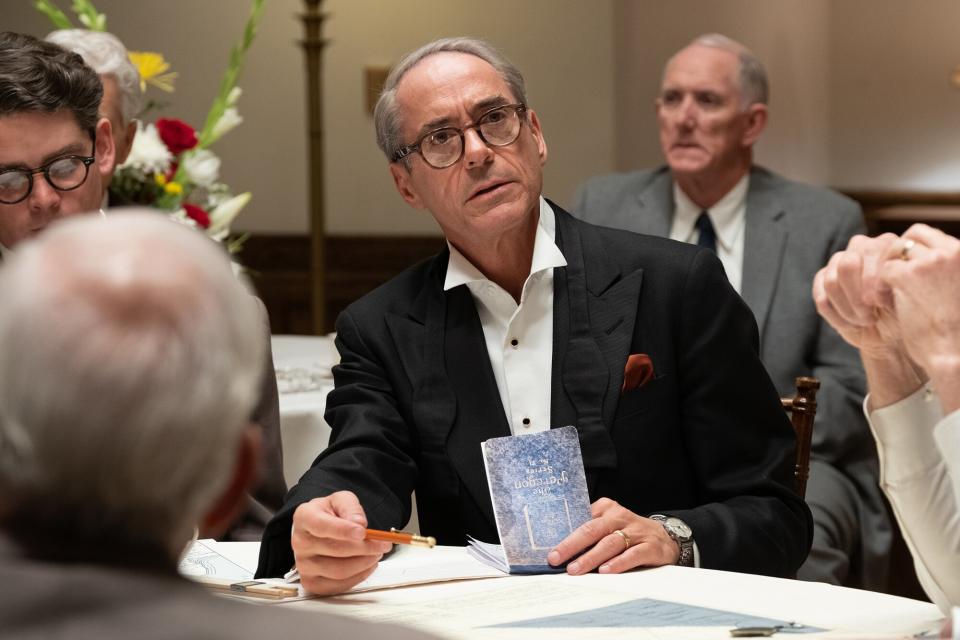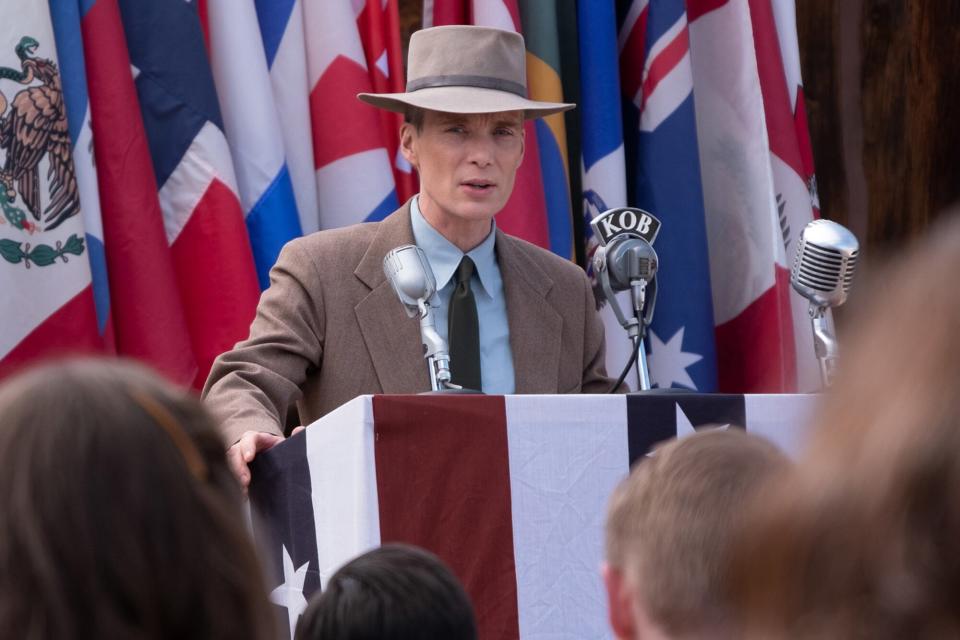Oppenheimer review: Christopher Nolan's powerful, timely masterpiece deserves the biggest screens

- Oops!Something went wrong.Please try again later.
- Oops!Something went wrong.Please try again later.
- Oops!Something went wrong.Please try again later.
- Oops!Something went wrong.Please try again later.
Like the brilliant scientist it takes as its subject, Oppenheimer arrives at a crucial moment in history. At a time when almost every big-budget Hollywood movie (including its opening weekend rival, Barbie) is drawn from corporate intellectual property, Oppenheimer is an unapologetically brainy movie with great actors playing real people, a true story with important details many viewers will be learning for the first time, and which, despite its roots in reality, feels massive and worthy of director Christopher Nolan's beloved IMAX screen.
As the title makes clear, this movie is about J. Robert Oppenheimer, the "father of the atomic bomb." For most of the three-hour runtime, Nolan places the viewer inside Oppenheimer's prodigious brain. We see the world as this theoretical physicist did, meaning the action is often interrupted by incredible visions of subatomic particles and cosmic fire. Yet Oppenheimer also has aspects of a memory play, or at least an exhaustive biography cut up and shuffled around. Even more than Nolan's previous film, Tenet, Oppenheimer flits about in time, effortlessly moving in and out of different events that took place across several decades, drawing connections that are logical but far from linear.
Embodying the man at the center of this universe, the constant in this shifting sea of science and history, is therefore no easy task — but Cillian Murphy rises to the challenge with an absolutely absorbing performance. Murphy has been working with Nolan for years, often in key supporting roles such as the villainous Scarecrow in Batman Begins and the primary target of Inception's dream heist. But the actor has proved his leading-man bona fides elsewhere (most recently in the long-running Netflix crime series Peaky Blinders) and finally brings that side of his skillset home to Nolan. No question, the close-ups on Murphy's face as Oppenheimer thinks through the 20th century's thorniest problems are as compelling as the film's atomic explosions, and as deserving of the biggest screen possible.

Melinda Sue Gordon/Universal Pictures Cillian Murphy in 'Oppenheimer'
But just as Oppenheimer, for all his world-historical genius, could only accomplish his great feat because he was surrounded by many other brilliant thinkers, so is Murphy supported by a galaxy of top-notch actors. Matt Damon brings his movie-star charisma to General Leslie Groves, the military head of the Manhattan Project whose gruff charms obscures his ulterior motives.
Robert Downey Jr. plays Lewis Strauss, Oppenheimer's rival for control over postwar nuclear policy, and uses his own considerable acting powers to carve out a sizable portion of the film for himself. Strauss' strategy meetings amidst contentious 1959 Senate hearings over his cabinet nomination are the only scenes not set from Oppenheimer's direct perspective, signified both by their black-and-white color grading and Downey's domination of the screen. Downey was one of the most popular and influential American movie stars of the 2010s, but through some mixture of pandemic-era delays and post-Marvel malaise, it's been years since we've seen him in top form. Watching Downey give such a meaty big-screen performance again is not an opportunity to be squandered — especially considering the meta resonance of Downey and Nolan, who each played foundational roles in the rise of the modern superhero blockbuster, collaborating on a film about an inventor feeling ambivalent about his great creation.
Other standouts from Oppenheimer's deep bench include David Krumholtz, following up his recent heartbreaking Broadway performance in Tom Stoppard's Leopoldstadt with a key turn here as physicist Isidor Isaac Rabi. Krumholtz brings an important sense of Jewish experience to a movie whose protagonist (a Jewish person, played by an Irish actor) is constantly talking about the need to build the atomic bomb before the Nazis do. Rabi is more skeptical: "I don't want decades of physics to culminate in a bomb."
Another Jewish critic of the supposedly anti-Nazi atomic bomb is Albert Einstein, whom Tom Conti plays with the levity of an old legend who has seen the world transformed by his greatest accomplishment (the theory of relativity) in a way he does not care for. By the time the film ends, Oppenheimer will understand how he feels. After all, the atomic bomb was ultimately not used to defeat the Nazis, but to incinerate Japanese civilians.

Melinda Sue Gordon/Universal Pictures Robert Downey Jr. in 'Oppenheimer'
The Manhattan Project was mostly a boys' club, as many of Nolan's past movies have been. Of all the criticisms the highly-successful director has attracted throughout his career, the stickiest is that his female characters are often "dead wives," whose ghostly after-images serve merely as motivation for the male protagonists. But Emily Blunt's Kitty Oppenheimer is defiantly alive, in spite of the worldwide crises of the '30s and '40s. Far from the archetype of a "devoted wife," Kitty is not shy about expressing her frustrations with motherhood or her dissatisfaction with politics. Blunt is a great partner for Murphy in their scenes together: bringing him down to Earth when he's off in the clouds, reminding him to fight when he seems content to let history wash over him.
The other primary female character in the film, Jean Tatlock, is played by Florence Pugh. The rising star feels a bit out of place standing alongside her older and more experienced costars, but Pugh brings Oppenheimer a heaping helping of sex and politics — two sides of life that have often been missing from Nolan's earlier films. Tatlock was a committed communist, and attended several party meetings alongside Oppenheimer (who was disturbed by the rise of genocidal Nazism and wanted to support the anti-fascist Republicans in the Spanish Civil War).
The film's attention to political history contributes to its sense of timeliness. Here is a summer blockbuster whose characters vigorously discuss the importance of labor unions and anti-fascist organizing, arriving just as Hollywood's real-life unions are walking picket lines. (The stars even left the film's glitzy premiere as soon as the SAG-AFTRA strike began.) Though viewers might expect Oppenheimer to climax with the Trinity Test at Los Alamos (which is indeed spectacular), the film spends a final hour exploring the 1954 closed-door hearing where Oppenheimer's security clearance was revoked for his ties to communists. Standing in for the McCarthyite era at large, these scenes demonstrate how despite the Allied victory over the fascists, the use of Oppenheimer's atomic bomb empowered reactionaries at home to betray the very people who made their victory possible.

Melinda Sue Gordon/Universal Pictures Cillian Murphy in 'Oppenheimer.'
Content meets form here. Oppenheimer is full of heady topics like quantum mechanics and political history, which few viewers will consider themselves experts on. But the film explains these ideas in ways more creative than the exposition dumps of Inception or the just-roll-with-it chaos of Tenet. When Oppenheimer first meets Kitty, she asks him to explain quantum physics. He does so by saying that everything in existence is composed of individual atoms, strung together by forces that make matter seem solid to our eyes, even though it's essentially not. In their next scene, Kitty explains how her second husband was a union organizer who died fighting fascists in Spain. Her life, which seemed solid, was completely undone by a single tiny bullet. Oppenheimer gets to experience this firsthand in 1954, when people who he thought of as allies and friends betray him for their own personal gain.
The study of physics is bifurcated into two disciplines: theory (Oppenheimer's specialty) and practice (embodied by Josh Hartnett's Ernest Lawrence). Communism, too, is often divided into theory and practice. Though they may seem disparate, the many elements of Oppenheimer refract and reflect each other, like a bunch of atoms creating a chain reaction or a group of scientists building off each other's ideas to forge something new. Grade: A
Want more movie news? Sign up for Entertainment Weekly's free newsletter to get the latest trailers, celebrity interviews, film reviews, and more.
Related content:

